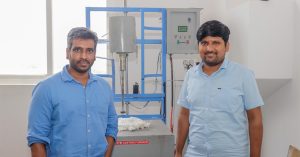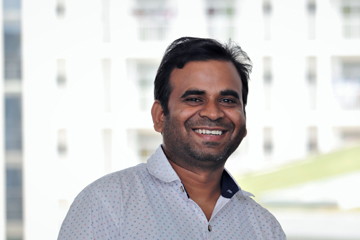Inauguration of Freshmen Orientation Programme-2021
The grand virtual inauguration of the Freshmen Orientation Programme-2021 took place on August 25, 2021, at 2.30 pm. Dr P Sathyanarayanan, President; Prof V S Rao, Vice-Chancellor and Prof D Narayana Rao, Pro-Vice-Chancellor, welcomed the freshers into the university. The Orientation Programme will be continued till September 07, 2021.
In the Presidential address, Dr Sathyanarayanan asserted SRM University’s latest achievements in Placement, Higher Studies and Entrepreneurship. Unlike many other universities, which concentrates on producing job-seeking graduates, SRM University-AP prefers to deliver job providers. Thus, this university gives grave emphasis on Entrepreneurial and Innovative activities. The university is proud of its budding entrepreneurs, founders of OurEye.ai, who secured an angel investment of $120000. SRM University-AP is unique in many ways, and that is one of the reasons that attract meritorious students to the university. SRM University-AP further offers special scholarships for brilliant students. The university gives equal importance to Placement, Higher Studies and Entrepreneurship to support the students in realising their dreams and potential. Dr Sathyanarayanan believes that talent, discipline and opportunity can change a student’s future, provided he/she makes good use of it. “Stress on the hard work, capitalise your talent with SRM University-AP’s experiential programme to find success at your doorstep,” advised Dr Sathyanarayanan.
In his address, Prof V S Rao emphasised on the transition from the School to the University system. The known world is going to change, many of the things students will be experiencing for the first time – be it hostel living or continual internal evaluation instead of annual exams. Prof Rao further explained the importance of a multidisciplinary approach in education and research. Following the recommendation of National Education Policy-2020, SRM University-AP highly stresses on interdisciplinary learning. Time management is another critical factor that is going to affect the students. With the aim to provide holistic education, the university also puts an emphasis on extra-curricular and co-curricular activities. Starting from various clubs and societies to the learning of international languages, SRM University-AP provides many opportunities to the students. One of the distinctive features of the university is that the students can design their future here. From the choice of courses to the choice of careers, SRM University-AP provides support at every level to the students.
In the concluding remarks, Prof D Narayana Rao delved into the importance of innovation and research. Every nation, who aspires to acquire global leadership, has to be very sound in science and technology. India is now one of the top 5 emerging economic powers in the world. The responsibility lies on the shoulders of the next generation of students to take India to the top. With immense passion and willpower, it is possible to witness that achievement.
During the Orientation Programme, eminent personalities from different spheres will be inspiring and motivating students. Prof K N Satyanarayana, Director-Indian Institute of Technology-Tirupati, Dr Jaya Prakash Narayan, Former Secretary to Govt. of Andhra Pradesh, Mr VV Lakshmi Narayana, former JD-CBI, Dr Hanuman Chowdary, Director of Centre for Telecom Management and Studies and Chairman of Pragna Bharati, Padma Bhushan Dr K Varaprasad Reddy, Ms Koka Vijayalakshmi, Prof B S Murty, Director-IIT Hyderabad, will be addressing the students in the fortnight-long programme.
Beyond the motivational lectures, SRM University-AP has organised sessions on Yoga and Meditations in collaboration with Heartfulness Institute to provide holistic development to the students.
- Published in News
First patent granted to SRM University-AP
Title of the Patent: A Process for Preparing Magnesium Foams
Patent applicant: SRM University-AP, Andhra Pradesh
Patent Application number: 202041001715
Date of Filing: 14/01/2020
Date of Publication: 24/01/2020
Date of Grant: 16/08/2021
 Prof G S Vinod Kumar and his PhD Scholar Mr Dipak Nandkumar Bhosale from the Department of Mechanical Engineering has brought the first granted patent to SRM University-AP. The patent titled “A Process for Preparing Magnesium Foams” is on the novel processing of Magnesium alloy foams via molten metal route. Metal foams are the class of novel ultra-lightweight and high strength materials used for engineering structures. Under the light-alloy category, Magnesium alloys possess greater challenges to foam and the inventors Mr Dipak Bhosale, PhD scholar and Prof Vinod Kumar (PhD supervisor) of Dept. of Mechanical Engineering have come up with a novel process to foam Magnesium alloy effectively. The patent was filed on January 14, 2020, and granted on August 16, 2021. It is indeed commendable that the patent grant is obtained in just 16 months from the date of application.
Prof G S Vinod Kumar and his PhD Scholar Mr Dipak Nandkumar Bhosale from the Department of Mechanical Engineering has brought the first granted patent to SRM University-AP. The patent titled “A Process for Preparing Magnesium Foams” is on the novel processing of Magnesium alloy foams via molten metal route. Metal foams are the class of novel ultra-lightweight and high strength materials used for engineering structures. Under the light-alloy category, Magnesium alloys possess greater challenges to foam and the inventors Mr Dipak Bhosale, PhD scholar and Prof Vinod Kumar (PhD supervisor) of Dept. of Mechanical Engineering have come up with a novel process to foam Magnesium alloy effectively. The patent was filed on January 14, 2020, and granted on August 16, 2021. It is indeed commendable that the patent grant is obtained in just 16 months from the date of application.
Metal foam is a cellular structure consists of solid metal with gas-filled pores. The pores can be sealed (closed-cell foam) or interconnected (open-cell foam). The present patent relates to a process for the preparation of closed-cell Magnesium foams using dolomite [CaMg (CO3)2] as a blowing agent (gas source), through a liquid metal route. The inventors have demonstrated economical and naturally occurring mineral dolomite to be an effective blowing agent for preparing magnesium foams and in-situ formed MgAl2O4 (spinel) particles as the stabilizing agent during stabilization of foams. The Magnesium foams produced by the process of the present disclosure have a good expansion, lower density, uniform pore size distribution and polyhedral pore structure. Through the present process Magnesium foams with 88% porosity 0.20 g/cm3 foam density was obtained. Magnesium foam is an attractive material that exhibits a unique combination of mechanical, physical, thermal, electrical and acoustic properties. It has high strength to weight ratio, good compressive strength and high energy/shock/vibration/sound absorption efficiency. Owing to these properties the magnesium foam finds potential in lightweight structural applications, sound-absorbing, energy and vibration and shock damping application.
$1750 cash prize awarded to Team Hexagon at the International Hackathon 2021
Yuvraj Tankala and Joseph K Paul from the Department of Computer Science and Engineering, SRM University-AP has successfully bagged a cash prize of $1750 at the Datastax Hackathon held from Dec 2020 to Feb 2021. The duo formed the “Team Hexagon” and demonstrated their full-stack AI monitored online classroom and examination portal project at the international competition conducted by Datastax. It powered the innovative data apps to the Home Depot, T-Mobile, Intuit, and half of the Fortune 100 companies.
Rakuten India Enterprise Private Limited conducted this 24-hour challenge competition amongst 7000+ participants. Based on three rounds- 1) Ideation Phase 2) Build Phase 3) Finals-winners were decided. Each team comprised of one to four members and they were allotted various themes such as Mobile and Web Development, Web Analytics, Platform Development and Backend Engineering, Data Science, Machine Learning and Artificial Intelligence.
While briefing on the project, Team Hexagon elucidated, “We were excited to participate in the competition and immediately started working on the project. After outlining the base of the project, we were assured that it could create a positive impact during this unprecedented time of Covid-19 outbreak. The education system is facing tough times while managing online assessments. We introduced an AI model-based monitoring system for examiners and examinees involved in the evaluation process. The application follows the head and lip movements of the examinee by considering the various parameters. It tracks the head movement in two axes (up-down and right-left) and warns the examinee to concentrate on the screen. In a similar way, it follows the lip movement and alerts the examiner when found any abnormal movements in between assessment”.
Yuvraj and Joseph presented their project before Technology Business Incubator’s panel, which was shortlisted from 34 other proposals. Under this programme, they went under rigorous training for 12 months and received the felicitation of industry support, seed funding, innovation fund support, industry connectivity with the key players in the market. Winning over the competitive challenges has given the duo high confidence to work on multiple projects and plan to lead off a venture after the completion of academic years.
- Published in CSE NEWS, Departmental News, News
CRIDAP appoints Dr Ghanshyam Pandey as an expert for agriculture
 Dr Ghanshyam Pandey, Assistant Professor of Economics, SRM University – AP has been appointed as an expert for agriculture, rural development, livelihood issues, and climate change and agriculture by The Centre of Integrated Rural Development for Asia and Pacific (CRIDAP). CRIDAP is an intergovernmental and autonomous organization and has 15 member countries. The member countries are Afghanistan, Bangladesh, Fiji, India, Indonesia, Iran, Lao PDR, Malaysia, Myanmar, Nepal, Pakistan, Philippines, Sri Lanka, Thailand, and Vietnam. His tenure of appointment will be up to 2024.
Dr Ghanshyam Pandey, Assistant Professor of Economics, SRM University – AP has been appointed as an expert for agriculture, rural development, livelihood issues, and climate change and agriculture by The Centre of Integrated Rural Development for Asia and Pacific (CRIDAP). CRIDAP is an intergovernmental and autonomous organization and has 15 member countries. The member countries are Afghanistan, Bangladesh, Fiji, India, Indonesia, Iran, Lao PDR, Malaysia, Myanmar, Nepal, Pakistan, Philippines, Sri Lanka, Thailand, and Vietnam. His tenure of appointment will be up to 2024.
Dr Ghanshyam Pandey’s role in the organisation:
- CIRDAP resource person to participate in project proposal development and consultancy.
- CIRDAP resource person for flagship training courses.
- Reviewer of Asia-Pacific Journal on Rural Development (APJORD).
- Part of CIRDAP Think Tank for knowledge sharing and solutions to IRD and PA.
- To expand CIRDAP Think Tank Networks.
- To advise on refining CIRDAP Strategic Plan 2020-2024.
About the organisation:
The Centre on Integrated Rural Development for Asia and the Pacific (CIRDAP) is a regional, intergovernmental and autonomous organisation. It was established on 6 July 1979 at the initiative of the countries of the Asia-Pacific region and the Food and Agriculture Organization (FAO) of the United Nations with support from several other UN bodies and donors. The Centre came into being to meet the felt needs of the developing countries at that time as an institution for promoting integrated rural development in the region. From the original six members, CIRDAP has now grown up as a Centre of 15 member countries. The member countries are Afghanistan, Bangladesh (Host State), Fiji, India, Indonesia, Iran, Lao PDR, Malaysia, Myanmar, Nepal, Pakistan, Philippines, Sri Lanka, Thailand and Vietnam. Operating through designated contact ministries and link institutions in member countries, CIRDAP promotes regional cooperation. It plays a supplementary and reinforcing role in supporting and furthering the effectiveness of integrated rural development programmes in Asia and the Pacific.
- Published in Departmental News, Economics Current Happenings, Economics News, News, Research News

